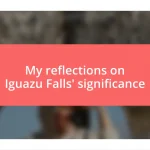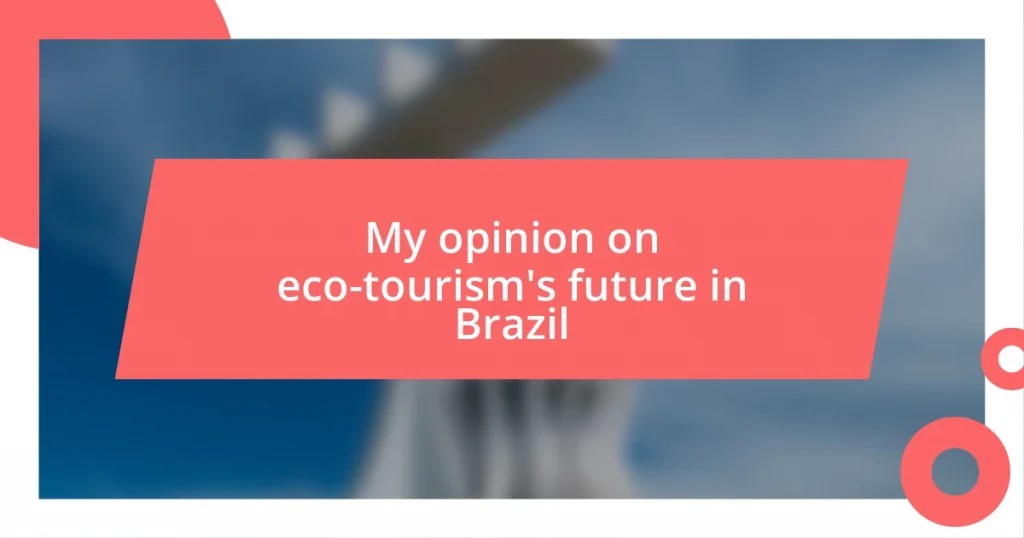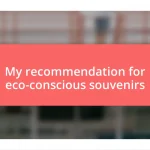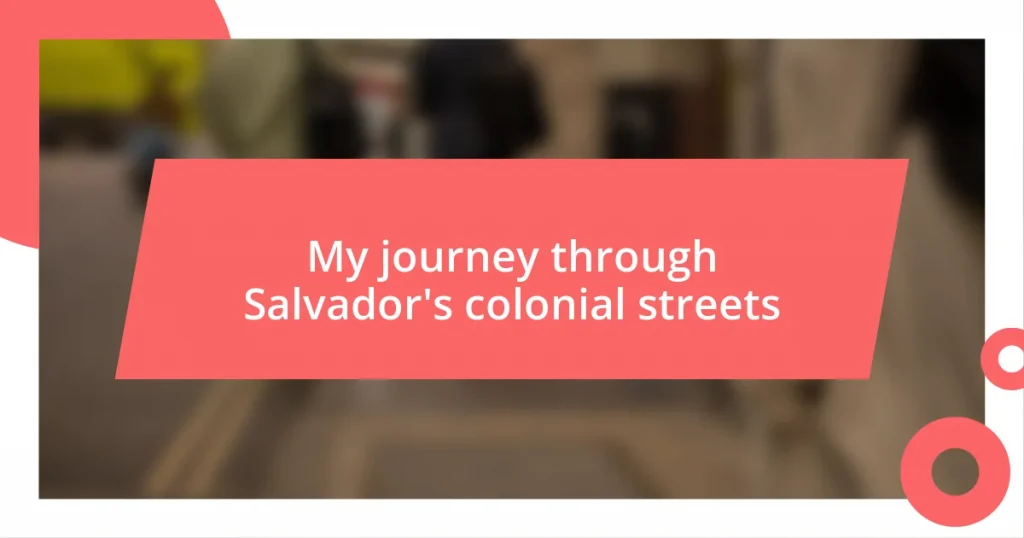Key takeaways:
- Eco-tourism in Brazil balances adventure, culture, and conservation, empowering local communities while promoting environmental stewardship.
- Key trends include experiential travel, community-based initiatives, and a growing demand for sustainable practices among travelers.
- Over-tourism, insufficient infrastructure, and conflicts between conservation and local livelihoods present significant challenges for eco-tourism growth.

Understanding eco-tourism in Brazil
Eco-tourism in Brazil is a vibrant blend of adventure, culture, and conservation, captivating travelers with its diverse landscapes. When I first visited the Amazon Rainforest, I was overwhelmed by its diversity—the sounds of nature, the vibrant colors of flora, and the unmatched serenity of the environment. It gets me thinking, how often do we pause to truly immerse ourselves in such beauty?
In recent years, Brazil has witnessed a growing movement towards eco-friendly travel, aiming to preserve its unique ecosystems while supporting local communities. This raises a crucial question for me: can we find a balance between economic growth and environmental sustainability? From my perspective, successful eco-tourism can empower local populations, allowing them to protect their heritage while sharing it with the world.
The allure of eco-tourism lies not just in exploring breathtaking places, but also in forming connections with the Earth’s wonders and the people who call it home. I recall a moment while kayaking through Pantanal, where I encountered a family of capybaras grazing peacefully. It struck me then how eco-tourism is about more than just the sights; it’s about fostering an appreciation and stewardship for the environment. Isn’t it this very connection that we should cherish and promote?
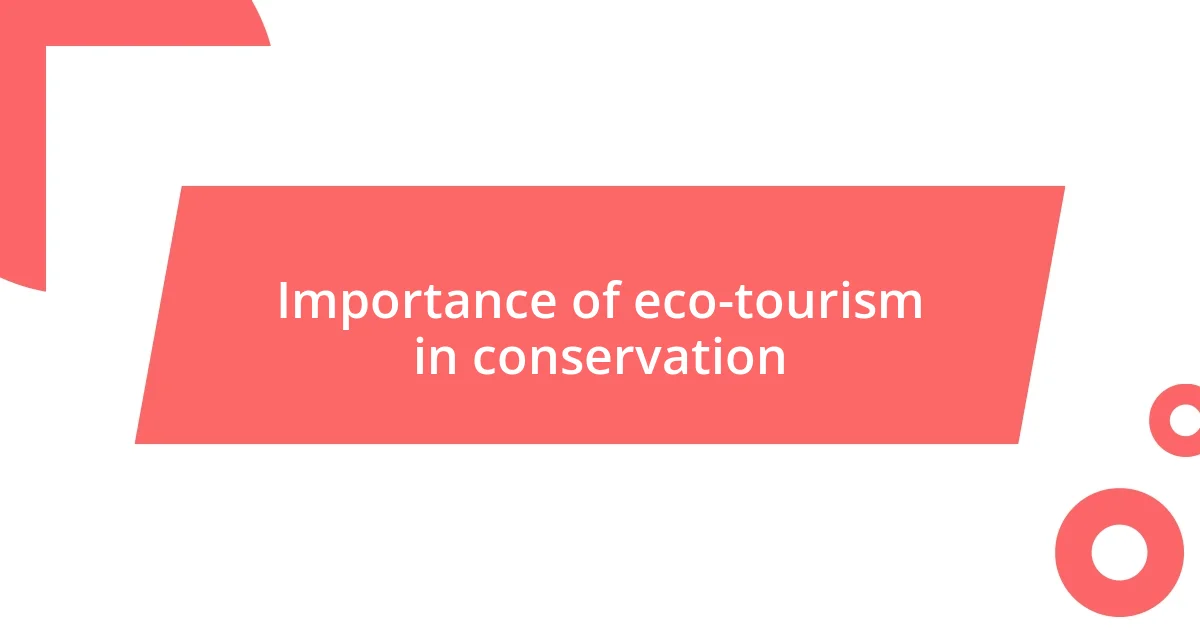
Importance of eco-tourism in conservation
Eco-tourism plays a pivotal role in the conservation of Brazil’s most precious ecosystems. By promoting sustainable travel practices, it encourages visitors to appreciate the natural beauty while contributing to its preservation. I remember a particular excursion to Chapada dos Veadeiros, where I witnessed firsthand how local guides adeptly balance sharing their knowledge of biodiversity with efforts to protect the fragile environment. This integration fosters respect and understanding of the natural world, which is essential for genuine conservation efforts.
Here are some key reasons why eco-tourism is crucial for conservation:
- Financial Support for Protected Areas: Eco-tourism generates revenue, which can be reinvested into conservation projects and local communities.
- Awareness and Education: Engaging travelers creates awareness about environmental issues, inspiring more people to advocate for conservation.
- Sustainable Practices: It promotes responsible tourism that minimizes ecological footprints, ensuring that natural habitats remain unspoiled.
- Community Empowerment: Local communities gain economic incentives to protect their environment, leading to sustainable livelihoods.
- Biodiversity Preservation: By valuing unique ecosystems, eco-tourism encourages the protection of diverse species and habitats.
Reflecting on these points, I can’t help but feel a sense of hope. When I see travelers actively participating in initiatives like reforestation projects in the Atlantic Forest, I realize that eco-tourism can be a powerful ally in the fight for conservation.
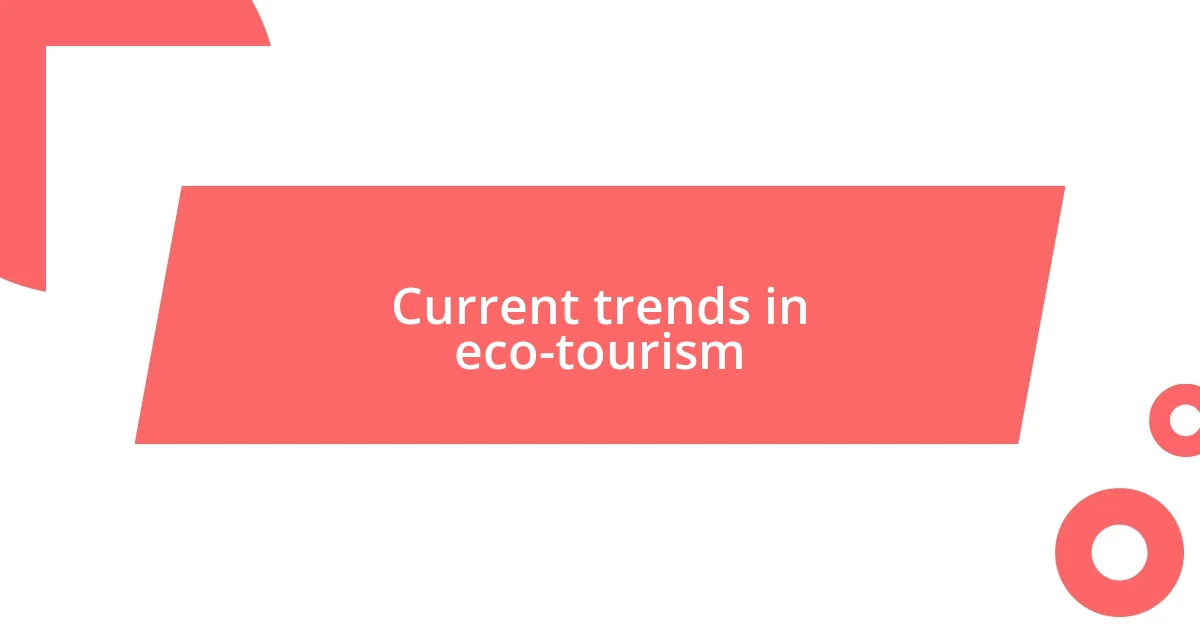
Current trends in eco-tourism
It’s fascinating to observe how eco-tourism in Brazil is shifting towards more immersive and experiential travel. Unlike traditional tourism, which often centers around sightseeing, eco-tourism invites travelers to engage deeply with nature. On my latest trip to the Pantanal, I participated in a bird-watching tour led by a local expert. The excitement of spotting a rare Jabiru stork stirred my emotions, illuminating the importance of firsthand experiences in fostering a connection with wildlife. This trend reflects a growing awareness among travelers about the impact of their visits.
Another current trend in Brazil is the rise of community-based eco-tourism, which empowers local populations to take charge of their tourist offerings. I recall visiting a small village in the Amazon where locals shared their stories and customs. This not only enriched my travel experience but also inspired me to support their craft and traditions. Such initiatives not only provide livelihoods for the communities but also promote cultural exchange and understanding.
The environmental sustainability movement is also gaining momentum in Brazil’s eco-tourism sector. More travelers are seeking carbon-neutral experiences or accommodations that prioritize renewable resources. Just last year, I stayed in an eco-lodge powered entirely by solar energy. It amazed me how I could enjoy luxury amidst nature while knowing my footprint was minimal. This awareness and desire for sustainability show just how much travelers value their ecological impact today.
| Trend | Description |
|---|---|
| Experiential Travel | Focus on immersive, hands-on experiences in nature, such as guided wildlife tours. |
| Community-Based Eco-Tourism | Empowerment of local communities by involving them in tourism and sharing their cultural heritage. |
| Environmental Sustainability | Increased demand for eco-friendly accommodations and carbon-neutral travel options. |
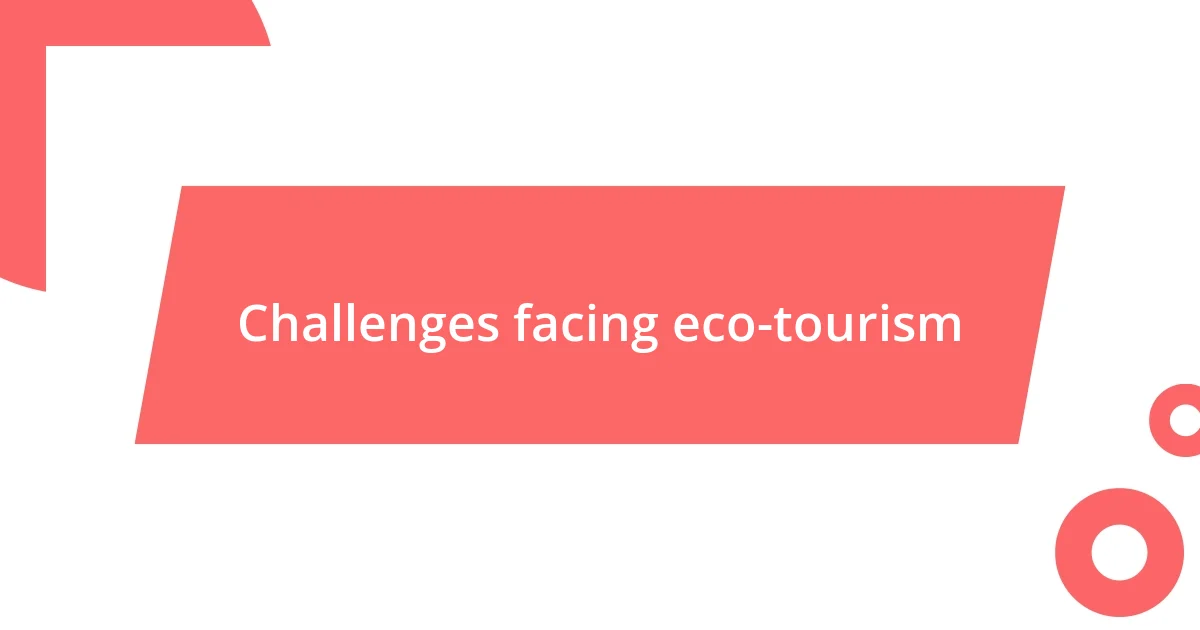
Challenges facing eco-tourism
The challenges facing eco-tourism in Brazil are significant and multifaceted. One major issue is the threat of over-tourism in popular destinations. I recall a visit to Ilha Grande, where the pristine beaches were becoming overcrowded, diminishing the natural beauty that initially drew me there. How can we ensure that ecologically sensitive areas are protected when they become too popular? This dilemma highlights the need for better management and visitor education to preserve these fragile ecosystems.
Another challenge is the lack of proper infrastructure and support systems for eco-tourism operators. During one of my trips to the Amazon, I encountered tour operators who were passionate but faced significant obstacles in providing quality experiences due to limited resources. How can we expect eco-tourism to thrive if the basics—like waste management and transportation—are often neglected? It’s crucial to invest in infrastructure that supports sustainable practices to ensure that eco-tourism can flourish without negatively impacting the environments and communities it aims to protect.
There’s also the ongoing conflict between conservation efforts and local communities. I remember a heartfelt conversation with a local family in the Pantanal who relied on fishing for their livelihood. They expressed concerns about eco-tourism potentially restricting their access to resources. How can we strike a balance between protecting natural habitats and supporting local economies? This question lingers in my mind, reminding me that the path to sustainable eco-tourism isn’t just about conservation; it’s about inclusivity and finding harmonious solutions that benefit both nature and the people who depend on it.
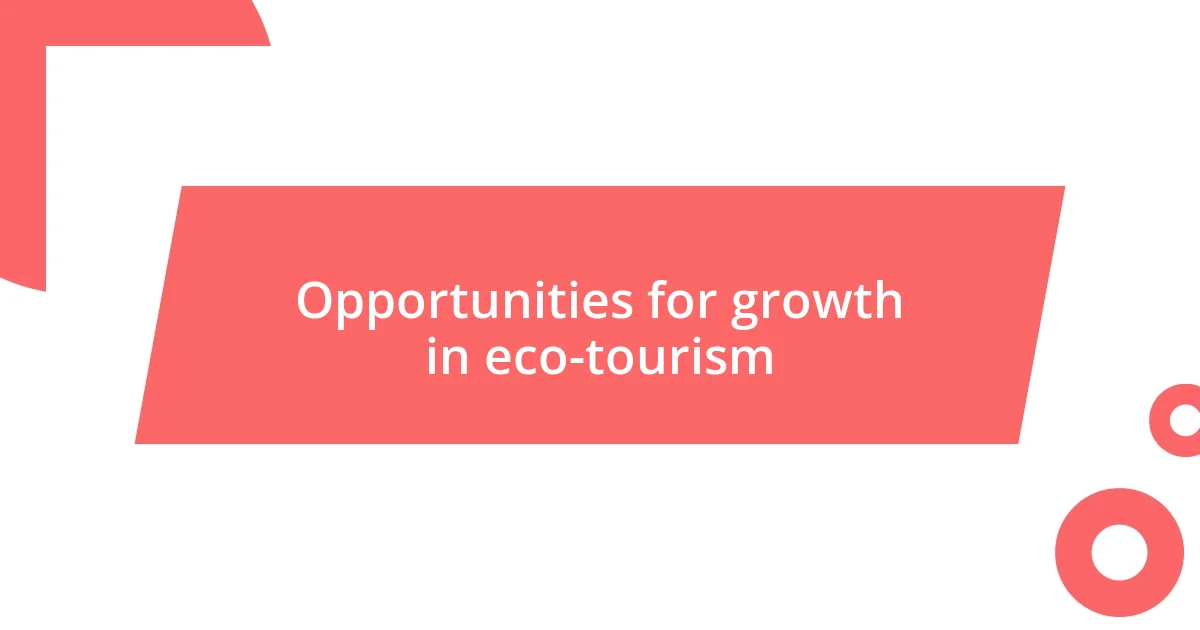
Opportunities for growth in eco-tourism
Brazil’s eco-tourism presents a wealth of opportunities for growth, particularly in combining travel with conservation efforts. While visiting Chapada Diamantina, I met guides who actively participated in reforestation projects, passionately sharing how their work benefits both the landscape and the local economy. This dedication showcases how eco-tourism can become a powerful driver for environmental awareness and community engagement.
Moreover, the rise of technology in eco-tourism offers exciting prospects. During a recent exploration of the Atlantic Forest, I learned about apps that help tourists identify flora and fauna while also tracking their ecological footprint. Isn’t it incredible to think that technology can deepen our connection to nature and encourage responsible tourism? The continued integration of digital tools could help educate travelers and promote sustainable practices, enhancing the overall experience.
Investing in unique, niche experiences also opens doors for eco-tourism growth. I vividly recall a night-time kayaking excursion in the Amazon, where bioluminescent algae illuminated the water like stars. This one-of-a-kind experience drew a crowd of adventurers eager to witness nature’s magic. Imagine how many more travelers would flock to Brazil if we could highlight such extraordinary encounters? By promoting distinctive offerings, Brazil can position itself as a leader in the eco-tourism market, attracting diverse visitors yearning for something truly memorable.
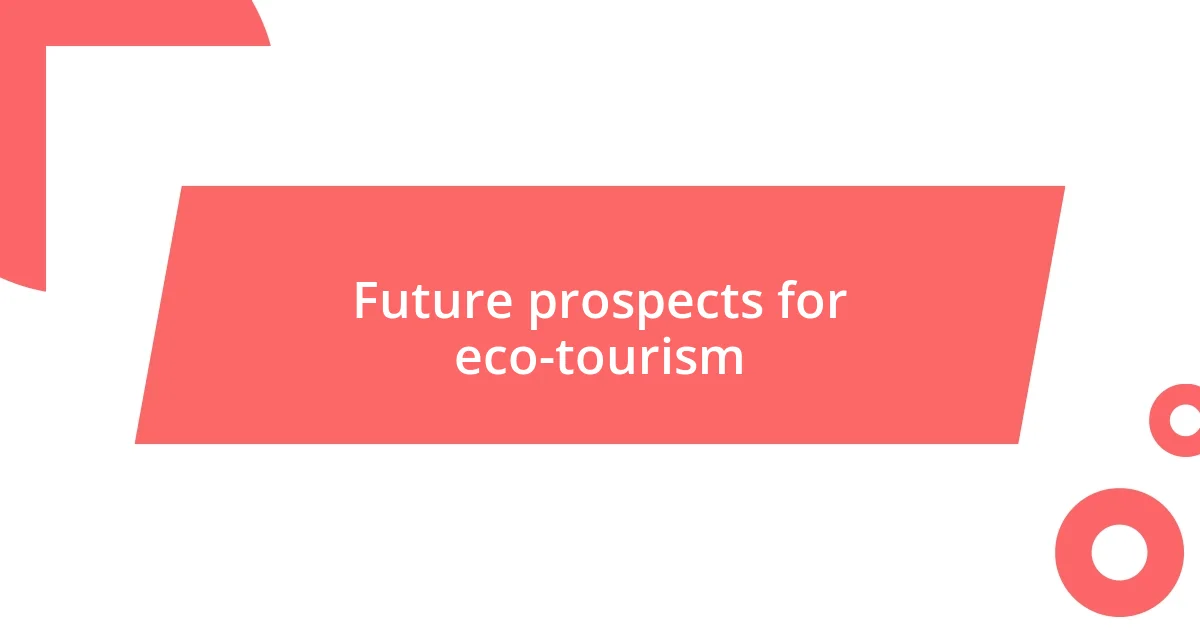
Future prospects for eco-tourism
As I reflect on the future prospects for eco-tourism in Brazil, I sense a growing awareness among travelers about the impact their visits have on the environment. Last summer, while hiking in the Serra da Bocaina National Park, I chatted with a group of tourists who felt deeply connected to the land. They expressed a strong desire to leave a positive mark. Isn’t it fascinating how awareness can transform travelers into stewards of nature? This shift in mindset could very well fuel the growth of eco-tourism, driving the demand for sustainable practices in the industry.
Moreover, Brazil has the potential to harness its rich cultural heritage alongside natural beauty to create immersive eco-tourism experiences. I remember being invited to a local festival in a small Amazonian village, where the vibrant colors of traditional attire and the sounds of celebration were infectious. That evening taught me that eco-tourism isn’t solely about nature; it’s also about people and their stories. By crafting experiences that intertwine environmental conservation and cultural immersion, Brazil can capture the hearts of tourists seeking more than just picturesque landscapes.
Looking ahead, collaboration between government, local communities, and eco-tourism operators will be crucial. I often think about my interactions with local guides who hold a wealth of knowledge about the flora and fauna around them. Their passion is unparalleled, yet they often lack the resources to elevate their efforts. How can we ensure these local champions of conservation are equipped to thrive? If we can foster partnerships centered on sustainability, the future of eco-tourism in Brazil will not only flourish but also resonate deeply with visitors, instilling a sense of shared responsibility for the planet.




